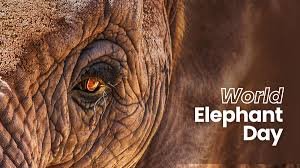World Elephant Day 2024: Celebrating Earth’s Gentle Giants
Introduction to World Elephant Day
World Elephant Day, observed annually on August 12th, is a global event dedicated to the preservation and protection of elephants. Established in 2012 by Canadian filmmakers Patricia Sims and Michael Clark, alongside the Elephant Reintroduction Foundation of Thailand, the day aims to raise awareness about the challenges faced by elephants across the globe. This year, the theme focuses on the critical issues surrounding elephant conservation, such as poaching, habitat loss, and human-elephant conflict.
The Significance of Elephants in Ecosystems
Elephants play a crucial role in maintaining the balance of their ecosystems. As keystone species, they help in seed dispersal, create water holes used by other animals, and shape their habitats by clearing trees and shrubs. These activities promote biodiversity and ensure the survival of many other species. However, the decline in elephant populations poses a significant threat to these ecosystems.
Threats to Elephant Populations
The global elephant population has been steadily declining due to various threats. Poaching for ivory is one of the primary reasons for the decrease in numbers, with thousands of elephants being killed each year. Habitat loss due to deforestation, urbanization, and agricultural expansion also plays a significant role in their dwindling numbers. Moreover, human-elephant conflict has escalated as elephants venture into human settlements in search of food, leading to fatalities on both sides.
Conservation Efforts and Global Initiatives
Several global initiatives and organizations are working tirelessly to protect elephants. Efforts include anti-poaching laws, habitat restoration projects, and awareness campaigns. International organizations like the World Wildlife Fund (WWF) and the International Union for Conservation of Nature (IUCN) have been instrumental in these endeavors. Additionally, local communities in elephant-range countries are being educated and empowered to coexist peacefully with these majestic creatures.
Conclusion
World Elephant Day 2024 serves as a reminder of the urgent need to protect and preserve elephants. As one of Earth’s most iconic and gentle giants, elephants are essential to the health of their ecosystems. It is imperative that global efforts continue to focus on reducing the threats they face, ensuring that future generations can witness the magnificence of these creatures in the wild.

Why This News is Important
Raising Awareness on Elephant Conservation
World Elephant Day 2024 highlights the critical need to address the threats facing elephant populations. The observance serves as an important platform to raise awareness about issues like poaching, habitat loss, and human-elephant conflict. For students preparing for government exams, understanding the significance of such global events is crucial as it reflects a broader understanding of environmental conservation and wildlife protection policies.
Relevance to Government Policies and Initiatives
The conservation of elephants is closely linked to various government policies, including those related to wildlife protection, anti-poaching laws, and habitat conservation. Government exam aspirants must be aware of these policies and initiatives, as questions related to environmental conservation are commonly asked in exams. This news also ties into international agreements and conventions that India is a part of, such as the Convention on International Trade in Endangered Species (CITES).
Impact on Ecological Balance and Biodiversity
The decline in elephant populations can have severe repercussions on ecological balance and biodiversity. This news underscores the importance of maintaining healthy elephant populations for the sustainability of ecosystems. Understanding this ecological impact is vital for students as it helps them grasp the interconnectedness of various species and the environment, a topic often covered in exams.
Historical Context:
The Legacy of Elephant Conservation
Early Efforts in Elephant Protection
Elephants have been revered and protected in various cultures for centuries. In India, elephants are considered sacred and have been a symbol of royalty and power. The conservation of elephants gained international attention in the late 20th century when the alarming rate of poaching for ivory was recognized as a global issue. The 1989 ban on international ivory trade by CITES marked a significant milestone in elephant conservation efforts.
The Establishment of World Elephant Day
World Elephant Day was officially launched on August 12, 2012, by Patricia Sims and the Elephant Reintroduction Foundation of Thailand. The day was created to bring attention to the urgent plight of elephants and to rally support for their protection. Over the years, World Elephant Day has garnered global support from organizations, governments, and individuals, becoming a pivotal event in the conservation calendar.
Continued Challenges and Progress
Despite significant progress in raising awareness and implementing protective measures, elephants continue to face numerous challenges. The illegal ivory trade, habitat fragmentation, and escalating human-elephant conflicts remain persistent issues. However, the global community’s continued efforts to address these challenges through legislation, conservation programs, and public education offer hope for the future of elephant populations.
Key Takeaways from World Elephant Day 2024
| S.No | Key Takeaway |
|---|---|
| 1. | World Elephant Day is celebrated on August 12th to raise awareness about elephant conservation. |
| 2. | Elephants play a crucial role in maintaining ecosystem balance and biodiversity. |
| 3. | Major threats to elephants include poaching, habitat loss, and human-elephant conflict. |
| 4. | Global initiatives like anti-poaching laws and habitat restoration are essential for elephant conservation. |
| 5. | Understanding the importance of elephant conservation is crucial for government exam aspirants, especially in the context of environmental policies and international agreements. |
Important FAQs for Students from this News
1. What is World Elephant Day?
World Elephant Day is an annual event celebrated on August 12th to raise awareness about the conservation needs of elephants. Established in 2012, it aims to highlight the threats faced by elephants and to promote efforts for their protection and preservation.
2. Why are elephants considered keystone species?
Elephants are termed keystone species because they play a critical role in maintaining the structure and diversity of their ecosystems. They aid in seed dispersal, create water holes used by other animals, and shape their habitats by clearing vegetation.
3. What are the primary threats to elephant populations today?
The primary threats to elephants include poaching for ivory, habitat loss due to deforestation and urbanization, and human-elephant conflicts. These threats have led to significant declines in elephant populations worldwide.
4. What measures are being taken to protect elephants?
Conservation efforts for elephants include anti-poaching initiatives, habitat restoration projects, and global awareness campaigns. Organizations such as WWF and IUCN work to implement and enforce protective measures to ensure the survival of elephants.
5. How does World Elephant Day impact government policies?
World Elephant Day raises awareness about elephant conservation, influencing government policies related to wildlife protection and anti-poaching laws. Understanding this impact is crucial for students preparing for government exams, as it reflects the role of international events in shaping environmental policies.
Some Important Current Affairs Links














